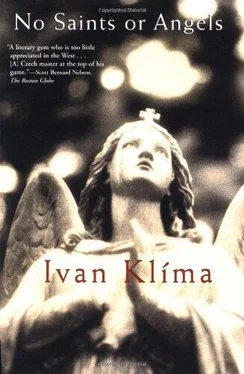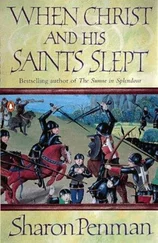It wasn't at all easy to fulfil that resolution. I wasn't the one who chose the individual cases I worked on — they were assigned to me. And the further one looked back into the past the more difficult it was to look for information; and even when I turned up names
in our files it didn't mean I would find the people they belonged to. It was as if they had disappeared from the face of the earth, or it was that the threads of their lives had been severed again and again. And even when I managed to retie some of them or root out new addresses and places of employment, I would discover that the thread had been severed for good, years before. And instead of meeting the scoundrel face to face, I'd find myself in a graveyard.
On the contrary, it was Mum who made demands on my life, particularly after Dad died, and I've resisted them. Only rarely have we spoken together about matters of importance. I didn't even tell her about breaking up with Věra, even though they knew each other and Mum was already sizing her up as a future daughter-in-law. I haven't even told her about my new love; I expect it would alarm her.
I find it impossible to say what attracts me to Kristýna. It's probably something subconscious. It's as if she reminded me of some encounter in the distant past, so distant, in fact, that it may not even have taken place in my present life. But it was an encounter that must have made an indelible impression on me.
We're poles apart in terms of age, profession and personality. She's educated — a dentist with an adolescent daughter — and she told me she suffers from depression. She warned me that she is insufferable when she's down. She smokes. She enjoys wine. I drink wine only rarely and I've never even tried smoking, probably on account of Dad.
I bring her roses.
'You're crazy,' she said the last time. 'Why should you offer me flowers?'
We were sitting in the wine bar again. We're still in the phase when we share important details about our lives. She told me about her father, who was a Party busybody whose activity she despised, and about her sister, who is a professional singer: apparently she predicted Kristýna would die by her own hand. She also
spoke without anger about her ex-husband, whom I esteem and she loved; I think she still loves him, although she won't admit it. I was also struck by her date of birth.
The thing is, I'm more and more convinced that the position of the planets is important for our lives, but I'm also beginning to penetrate the mystery that numbers have for us. When she mentioned that she was born on the day Stalin died, it struck me as an odd or even fateful coincidence.
The Soviet despot seems to me like some dreadful Titan: not one born from the blood of Uranus, but one constantly being reborn from the blood of his murdered victims. Although he died long before I was born, I am constantly being reminded of the crimes of some and the paltriness of others as I encounter them daily in the files I deal with. I'm convinced that his death reopened for part of mankind a door that was firmly locked against human dignity, tolerance, justice and compassion. To be born on the day of his death meant entering the world on one of the most mpmentous days of the twentieth century.
Kristýna also told me that her grandmother and all her relatives on that side of the family died in the gas chambers and that she was unable to reconcile herself with the fact that there were people who could poison others in their thousands, even babies and infants. I thought she would burst into tears as she was speaking about it; I could see she was crying inside over those murders of long ago and over the atrocities committed against her relations.
Was it possible to live in such a world? She had nothing to expect from life: she really expected nothing. From the way she assured me of this I sensed that, on the contrary, she still lives in expectation, she teeters on the borderline between expectation and despair. If despair prevails she could well put an end to herself. I think she is one of those who would not fear to take that step.
But she is afraid of me. She is afraid to come closer. We fear each other and yet we also attract one another.
But we have to live, I told her, in order to make discoveries, for
instance. To share them with others and pass them on. We have to strive so that justice doesn't disappear from the earth, or at least so that love should govern our lives.
'That's not a matter of at least,' she objected. 'But which of us is capable of it?'
She was expecting me to say that I could, that maybe together we both could, but I didn't, because she was right: I don't know anybody who could.
She has sunshiny hair almost down to her waist; it gives her a little-girl look, but her gaze is sad. She has the bearing of a queen. I find her sadness arousing. I longed to touch her, to caress, at least, those hands that radiated tenderness, but at the same time the thought seemed to me sinfully improper, as if it would mean crossing some barrier, breaking some taboo, whose violation would provoke divine retribution.
We drank a whole bottle of wine together, although I had only one glass. As we were saying goodbye she hesitated for a moment. I realized that she was waiting to see whether I might suggest we met again, or that she herself was about to make a similar suggestion. But we suppressed our urges and said nothing. I expect it would be more sensible never to see each other again.
6
He is lying next to me, naked. His skin is smooth, clean and fresh like Jana's. I wasn't the one who invited him home. I didn't seduce him; he asked me to pay him a call; he was alone at home as his mother was out of town.
He led me to his small room. Two of the walls are lined with bookshelves. Amidst the books an old couch, wide enough for one, maybe wide enough for two to make love, but not wide enough for two to sleep on. He has no pictures. Above the bed there hangs an American Indian totem, a little painted drum and
a mandolin. A computer stands on a small battered table. Alongside the windows there are two black loudspeakers. The window looks out on a yard; I noticed that even though the curtains are drawn.
He promised to show me some old prints. He promised me Beethoven, Chopin and Tchaikovsky and kept telling me I was the most beautiful and interesting woman he'd ever met. I didn't say I knew he had other intentions apart from showing me old prints. I didn't say that although his mother is out of town I'm also a mother, that he was simply looking at the world through some sort of hallucinatory spectacles. All I said was, 'Don't be silly, you can't mean it when you say I'm beautiful.'
He can't mean it seriously, but here he is lying next to me, caressing my breasts. He has long fingers; he could weave spells with them, not just play the mandolin or leaf through documents. His tongue is slightly rough and damp. When we were making love a moment ago he was patient and tender. Dear God, how long is it since a man was patient and tender with me? When was the last time I met a fellow who'd care about what I feel? He told me that he had only ever gone out with younger girls. He didn't add that he also wanted to try it for once with a woman who was old enough to be his mother. He just said, 'I want you to feel good with me.'
'I do feel good with you.' My toyboy put on some music but then forgot to change the CD.
'You're special,' he said.
'Special in what way?'
'As a person.'
'How can you know?'
'It's not a matter of knowing. I feel it. The way I feel you're often sad.'
'I'm not sad now.'
'Yes you are, even now.'
'Yes, maybe I am.'
'Why?'
'Because I feel good with you. Because I know it's only for a moment.' I don't say: I know you'll leave me.
Читать дальше












